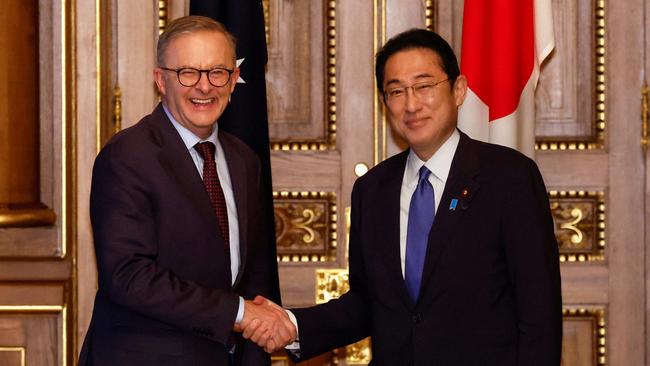Quad meeting: Passing the test by holding the line
The early signs are that Anthony Albanese more than passed his Tokyo Quad test.

The early signs are that Anthony Albanese more than passed his Tokyo Quad test.
“He was fantastic,” Kurt Campbell, one of Joe Biden’s closest foreign affairs advisers, told The Australian as he headed for lunch after the leaders and their advisers held their joint closed-door meeting. “He was so great in all of the meetings.”
There had been some disquiet in Quad capitals before the summit about Albanese’s attitude towards China.
One Indian foreign policy adviser said New Delhi was keen to probe Australia’s new leader for “any signs of panda sentimentality”.
There were also worries among some of Tokyo’s China hawks.
“There is no doubt that Beijing will try to use the change of government in Canberra to expand its influence again,” warned the Yomiuri Shimbun, an influential conservative Japanese masthead.
Albanese’s international debut went a long way to reassuring Tokyo, New Delhi and Washington that his new government is committed to the China-focused grouping.
“We have had a change of government in Australia, but our commitment to the Quad hasn’t changed,” Australia’s new Prime Minister said.
Campbell watched his performance closely, as did National Security Adviser Jake Sullivan and Secretary of State Antony Blinken.
Beijing may have a different assessment. Xi Jinping’s regime characterises its Australia problems right now as being all Scott Morrison’s fault. The team advising Albanese at Tuesday’s meeting knows how wrong that is.
There was Jan Adams, nodding as Foreign Minister Penny Wong chatted easily with her Japanese counterpart, Yoshimasa Hayashi, before the doors closed for the summit.
Adams, now Australia’s ambassador in Tokyo, was previously in Beijing. She was Australia’s ambassador from 2016 to 2019 as the Turnbull government passed foreign interference laws and banned Huawei from its 5G network.
It was not a happy posting.
All of the senior officials flanking Wong and Albanese in Tokyo have been part of the Australian system as it has enraged Beijing.
Justin Hayhurst, the head of DFAT’s geostrategic group, and the rest of the travelling delegation have negotiated the wrath of Xi’s administration.
They have lived the bilateral breakdown and know it goes back well beyond 2018 when Morrison became prime minister.
Now they are part of the machinery of government that is advising Albanese on how to handle Beijing.
On the eve of the Quad meeting, Chinese foreign policy experts urged Albanese to be a “second Whitlam”, and take a more docile approach to Beijing’s aggressive behaviour.
The Australian system, and Australia’s Quad partners, have different ideas.




To join the conversation, please log in. Don't have an account? Register
Join the conversation, you are commenting as Logout